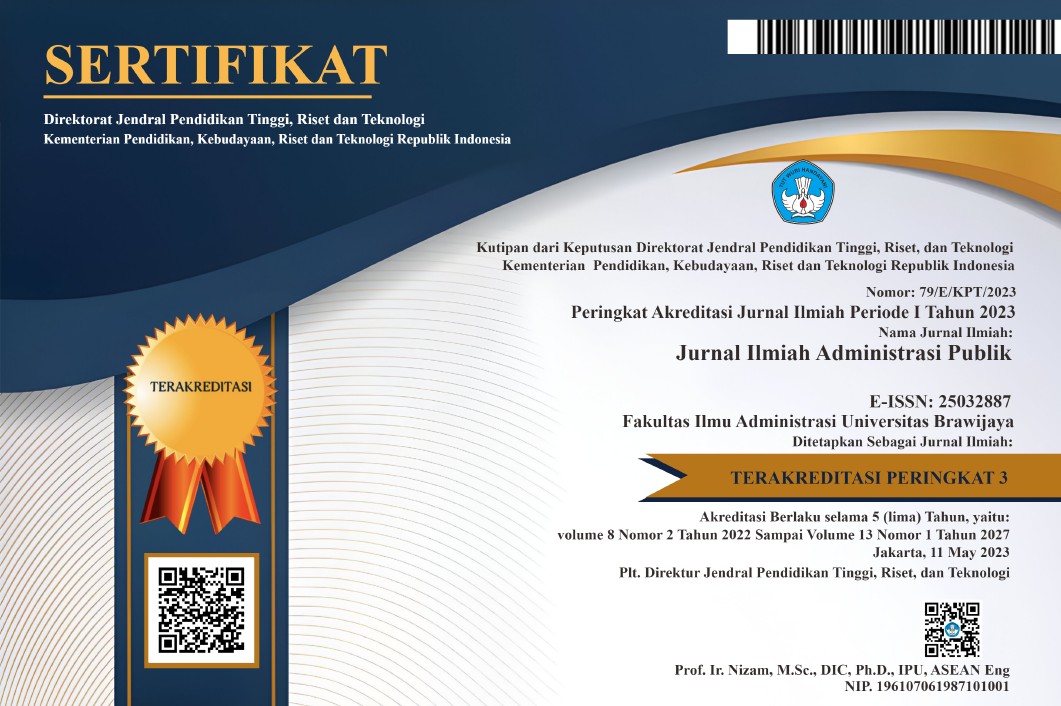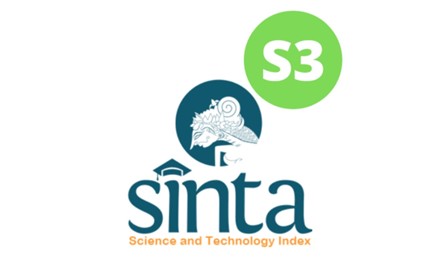Studi Perilaku Kepatuhan Wajib Pajak dalam Membayar Pajak Daerah
DOI:
https://doi.org/10.21776/ub.jiap.2018.004.02.5Keywords:
sikap atas kepatuhan pajak, kepercayaan atas pemerintah, niat untuk patuh, perrsepsi keadilan, kepatuhan membayar pajak daerahAbstract
The Objective of this research study is to examine the effect of attitude toward tax compliance on compliance pay local tax through the inttention to comply and to examine the effect of trust over government on compliance pay local tax through perception of justice. Data collected from questionnaire and analyzed with PLSbased SEM techniques with software SmartPLS version 2.0. The result of the analysis show both attitude toward tax compliance were found to be significantly on compliance pay local tax through the inttention to comply and the effect of trust over government also have a significant effect on compliance pay local tax through perception of justice.References
Ajzen, I. (1991). The Theory of Planned Behavior. Organizational Behavior and Human Decision Processess, Vol. 50, pp. 179-211.
Ajzen, I. (2005). Attitudes, Personality and Behavior, Second Edition. Berkshire, England: Open University Press.
Andreoni, J., Erard, B., & Feinstein, J. (1998). Tax Compliace. Journal of Economic Literature, Vol. 36, No.2, pp. 818-860.
Bdy. (2016). Puluhan Pengusaha Rumah Makan di Banyuwangi Tak Patuhi Pajak Pendapatan Daerah. Dapat diakses pada: http://sidikkasus-ri.blogspot.com/2016/09/puluhan-pengusaha-rumah-makan-di.htm [Diakses 16 Januari 2018].
Bobek, D., & Hatfield. (2003). An Investigation of the Theory of Planned Behavior and the Role of Moral Obligation in Tax Compliance. Behavioural Research In Accounting. Vol 15, No.1, pp. 13-38.
Damayanti, T. W. (2015). Analisis Kepatuhan Wajib Pajak: Tinjauan Berdasarkan teori Perilaku Terencana dan Teori Psikologi Fiskal dengan Orientasi Ketidakpastian dan Orientasi Religiusitas Sebagai Variabel Moderasi. Disertasi, Universitas Brawijaya, Malang.
Damayanti, T. W., Sutrisno, T., Subekti, I., & Baridwan. Z. (2015a). Trust and Uncertainty Orientation: An Efforts to Create Tax Compliance in Social Psychology Framework. Procedia-Social and Behavioral Sciences, Vol. 211(September), pp. 938-944.
Devos, K. (2013). Factor Influencing Individual Taxpayer Compliance Behavior. Springer, Netherland.
Eagly, A. H., & Chaiken, S. (1993). The Psychology of Attitudes. Fort Worth, TX: Harcourt Brace Jovanovitch.
Ernawati, W.D., & Purnomosidhi, B. (2011). Pengaruh Sikap, Norma Subyektif, Kontrol, Perilaku yang Dipersepsikan dan Sunset Policy Terhadap Kepatuhan Wajib Pajak dengan Niat Sebagai Variabel Intervening. Dapat diakses pada: http://purnomo.lecture.ub.ac.id/files/2012/01/Pengaruh-sikap-dll-thd-kepatuhan-WP1.pdf [Diakses 16 Januari 2018].
Fanani, Ardian. (2017). Kantor KPP Banyuwangi akan Sandera Wajib Pajak Membandel. Detiknews [Internet], 13 Februari 2017. Dapat diakses pada: https://news.detik.com/berita-jawa-timur/d-3421210/kantor-kpp-banyuwangi-akan-sandera-wajib-pajak-membandel [Diakses 16 Januari 2018].
Feld, L. P., & Frey, B. S. (2007). Tax Compliance as the Result of a Psychological Tax Contract: The Role of Incentives and Responsive Regulation. Law & Policy, Vol. 29, No. 1, pp. 102-120.
Hasseldine, D., & Bebbington, K. J. (1991). Blending Economic Deterrence and Fiscal Psychology Models in the Design of Responses to Tax Evasion: The New Zealand Experience. Journal of Economic Psychology, Vol. 12, No. 2, pp. 299-324.
Holtz, B. C. (2013). Trust Primacy: A Model of the Reciprocal Relations Between Trust and Perceived Justice. Journal of Management, Vol. 39, No. 7, pp. 1891-1923.
Jimenez, P., & Iyer. G. S. (2016). Tax Compliance in a Social Setting: The Influence of Social Norms, Trust in Government, and Perceived Fairness on Taxpayer Compliance. Advances in Accounting, incorporating Advances in International Accounting, Vol. 34, pp. 17-26.
Pemerintahan Kabupaten Banyuwangi. (2017). Rencana Kerja Pembangunan Daerah Pemerintah Kabupaten Banyuwangi Tahun 2017. Banyuwangi: Pemerintah Kabupaten Banyuwangi.
Rahayu, Siti Kurnia. (2013). Perpajakan Indonesia, Konsep dan Formal. Graha Ilmu: Yogyakarta.
Rudolph, T. J. (2009). Political Trust, Ideology, and Public Support for Tax Cuts. Public Opinion Quarterly, Vol. 73, No. 1, pp. 144-158.
Sujarwoto, S. (2017). Why decentralization works and does not works? A systematic literature review. JPAS (Journal of Public Administration Studies), 2(1), 1-10.
Sujarwoto, S. (2012). Political decentralization and local public services performance in Indonesia. Journal of Public Administration and Governance, 2(3), 55-84.
Sujarwoto, S. (2015). Desentralisasi, dinasti politik dan kemiskinan di Indonesia. Jurnal Ilmiah Administrasi Publik, 1(2), 1-6.
Sujarwoto, S., Yani, A. A., Mulyadi, A. E., & Li, D. E. (2021). Indonesia’s Social Justice Indexes 2018. Journal of Humanity and Social Justice, 3(1), 81-94.
Sujarwoto, S. (2013). Essays on decentralisation, public services and well-being in Indonesia. The University of Manchester (United Kingdom).
Sujarwoto, S. (2019). Model Revitalisasi Pondok Kesehatan Desa (Ponkesdes) dan Pos Pembinaan Terpadu (Posbindu) untuk Promosi Kesehatan dan Deteksi Dini Faktor Risiko Penyakit Jantung di Desa Sepanjang Kecamatan Gondanglegi Kabupaten Malang. Jurnal Ilmiah Administrasi Publik, 5(1), 126-132.
Sujarwoto, S. (2015). Desentralisasi, tata kelola pemerintahan, dan kemiskinan di negara-negara berkembang. Jurnal Ilmiah Administrasi Publik, 1(1), 14-16.
Sujarwoto, S., & Yumarni, T. (2005). Pelayanan jaminan kesehatan bagi masyarakat miskin melalui inovasi program jaminan pemeliharaan kesehatan masyarakat. Publisia Jurnal Kebijakan Publik, 9(3), 192-209.
Sujarwoto, S. (2015). Communal Conflict in Indonesia: Contagious or Latent Issues?. Jurnal Ilmu Sosial dan Ilmu Politik, 19(2), 99-100.
Sulistianingtyas, V. (2016). Studi Kepatuhan Wajib Pajak PBB P2 di Kota Probolinggo: Satu Perspektif Teori Keperilakuan Terencana dan Teori Atribusi. Tesis. Universitas Brawijaya, Malang.
Scholz, J. T., & Lubell, M. (1998). Adaptive Political Attitude: Duty, Trust and Fear as Monitors of Tax Policy. American Journal of Political Science, Vol.42(3), pp. 903-920.
Schmölders, G. (1959). Fiscal Psychology: A New Branch of Public Finance. National Tax Association, Vol. 4, No. 4, pp. 340-345.
Turner, J. C. (2005). Explaining the Nature of Power: a Three-Process Theory. European Journal of Social Psychology, Vol. 35, No. 1, pp. 1-22.
Tongler, B. (2007). Tax Compliance and Tax Morale: A Theoretical and Empirical Analysis. Northampton, MA: Edward Elgar Publishing, Inc.
Undang-undang Nomor 28 Tahun 2009 tentang Pajak Daerah dan Retribusi Daerah.
Wawan, A., & Dewi, M. (2011). Teori dan Pengukuran Pengetahuan, Sikap dan Perilaku Manusia cetakan kedua. Nuha Medika: Yogyakarta.
Zand, D. E. (1972). Trust and Managerial Problem Solving. Administrative Science Quarterly, Vol.17, No. 2, pp. 229-239.
Downloads
Published
Issue
Section
License
Copyright (c) 2018 Jurnal Ilmiah Administrasi Publik

This work is licensed under a Creative Commons Attribution-NonCommercial 4.0 International License.
If your paper is accepted, the author identified as the formal corresponding author for the paper will receive an email prompting them to login into Author Services; where via the JIAP Author Licensing Service they will be able to complete the license agreement on behalf of all authors on the paper.














